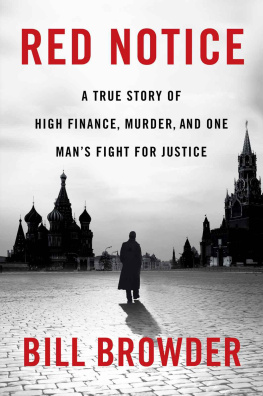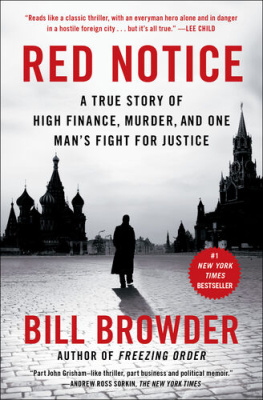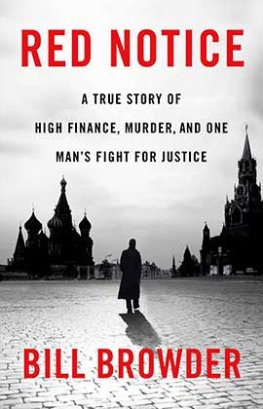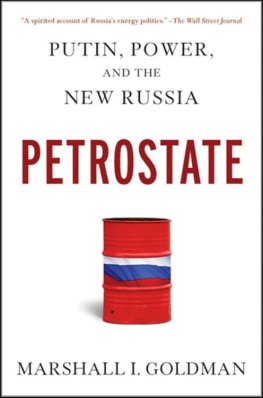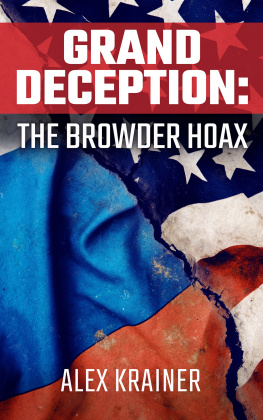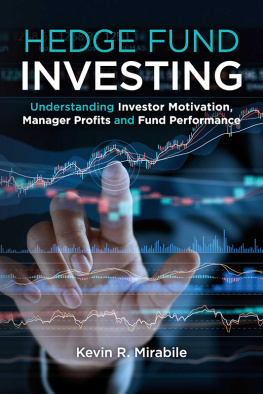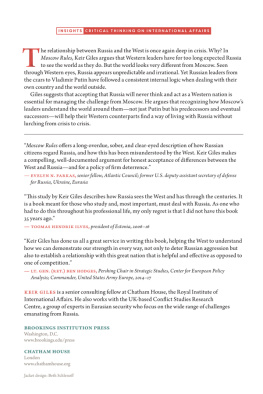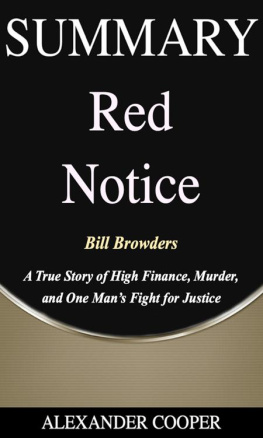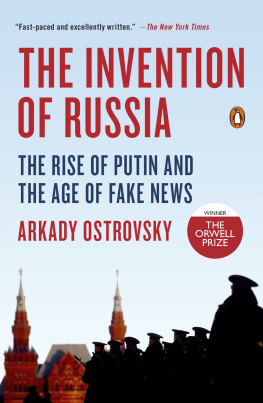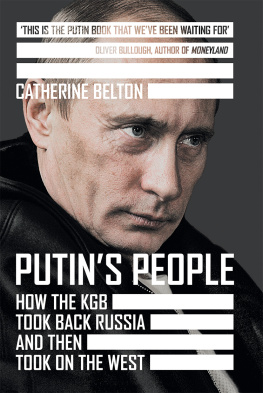Thank you for downloading this Simon & Schuster eBook.
Join our mailing list and get updates on new releases, deals, bonus content and other great books from Simon & Schuster.
C LICK H ERE T O S IGN U P
or visit us online to sign up at
eBookNews.SimonandSchuster.com
Contents
To Sergei Magnitsky, the bravest man Ive ever known.
Authors Note
Everything in this book is true and will surely offend some very powerful and dangerous people. In order to protect the innocent, some names and locations have been changed.
Red Notice n. A communication issued by Interpol requesting the arrest of wanted persons, with a view to extradition. An Interpol Red Notice is the closest instrument to an international arrest warrant in use today.
1
Persona Non Grata
November 13, 2005
Im a numbers guy, so Ill start with some important ones: 260; 1; and 4,500,000,000.
Heres what they mean: every other weekend I traveled from Moscow, the city where I lived, to London, the city I called home. I had made the trip 260 times over the last ten years. The 1 purpose of this trip was to visit my son, David, then eight, who lived with my ex-wife in Hampstead. When we divorced, I made a commitment to visit him every other weekend no matter what. I had never broken it.
There were 4,500,000,000 reasons to return to Moscow so regularly. This was the total dollar value of assets under management by my firm, Hermitage Capital. I was the founder and CEO, and over the previous decade I had made many people a lot of money. In 2000, the Hermitage Fund had been ranked as the best performing emerging-markets fund in the world. We had generated returns of 1,500 percent for investors who had been with us since we launched the fund in 1996. The success of my business was far beyond my most optimistic aspirations. Post-Soviet Russia had seen some of the most spectacular investment opportunities in the history of financial markets, and working there had been as adventurousand occasionally, dangerousas it was profitable. It was never boring.
I had made the trip from London to Moscow so many times I knew it backward and forward: how long it took to get through security at Heathrow; how long it took to board the Aeroflot plane; how long it took to take off and fly east into the darkening country that, by mid-November, was moving fast into another cold winter. The flight time was 270 minutes. This was enough to skim the Financial Times , the Sunday Telegraph , Forbes , and the Wall Street Journal , along with any important emails and documents.
As the plane climbed, I opened my briefcase to get out the days reading. Along with the files and newspapers and glossy magazines was a small leather folder. In this folder was $7,500 in $100 bills. With it, I would have a better chance of being on that proverbial last flight out of Moscowlike those who had narrowly escaped Phnom Penh or Saigon before their countries fell into chaos and ruin.
But I was not escaping from Moscow, I was returning to it. I was returning to work. And, therefore, I wanted to catch up on the weekends news.
One Forbes article I read near the end of the flight caught my eye. It was about a man named Jude Shao, a Chinese American who, like me, had an MBA from Stanford. He had been a few years behind me at business school. I didnt know him, but also like me, he was a successful businessman in a foreign land. In his case, China.
Hed gotten into a conflict with some corrupt Chinese officials, and in April 1998, Shao was arrested after refusing to pay a $60,000 bribe to a tax collector in Shanghai. Shao was eventually convicted on trumped-up charges and sentenced to sixteen years in prison. Some Stanford alumni had organized a lobbying campaign to get him out, but it didnt work. As I read, Shao was rotting away in some nasty Chinese prison.
The article gave me the chills. China was ten times safer than Russia when it came to doing business. For a few minutes, as the plane descended through ten thousand feet over Moscows Sheremetyevo Airport, I wondered if perhaps I was being stupid. For years, my main approach to investing had been shareholder activism. In Russia that meant challenging the corruption of the oligarchs, the twenty-some-odd men who were reported to have stolen 39 percent of the country after the fall of communism and who became billionaires almost overnight. The oligarchs owned the majority of the companies trading on the Russian stock market and they were often robbing those companies blind. For the most part, I had been successful in my battles with them, and while this strategy made my fund successful, it also made me a lot of enemies.
As I finished the story about Shao, I thought, Maybe I should cool it. I have a lot to live for. Along with David, I also had a new wife in London. Elena was Russian, beautiful, incredibly smart, and very pregnant with our first child. Maybe I should give it a rest .
But then the wheels touched down and I put the magazines away, powered up my BlackBerry, and closed my briefcase. I started checking emails. My focus turned from Jude Shao and the oligarchs to what I had missed while in the air. I had to get through customs, to my car, and back to my apartment.
Sheremetyevo Airport is a strange place. The terminal that I was most familiar with, Sheremetyevo-2, was built for the 1980 Summer Olympics. It must have looked impressive when it opened, but by 2005 it was far worse for the wear. It smelled of sweat and cheap tobacco. The ceiling was decorated with row upon row of metal cylinders that looked like rusty cans of Folgers coffee. There was no formal line at passport control, so you had to take your place in a mass of people and stay on guard so that no one jumped ahead of you. And God forbid you checked a bag. Even after your passport was stamped youd have to wait another hour to claim your luggage. After a four-hour-plus flight, it was not a fun way to gain entry into Russia, particularly if you were doing the trip every other weekend as I was.
I had done it this way since 1996, but around 2000 a friend of mine told me about the so-called VIP service. For a small fee it saved about an hour, sometimes two. It was by no means luxurious, but it was worth every penny.
I went directly from the plane to the VIP lounge. The walls and ceiling were painted pea-soup green. The floor was tan linoleum. The lounge chairs, upholstered with reddish brown leather, were just comfortable enough. The attendants there served weak coffee or overbrewed tea while you waited. I opted for the tea with a slice of lemon and gave the immigration officer my passport. Within seconds, I was engrossed in my BlackBerrys email dump.
I barely noticed when my driver, Alexei, who was authorized to enter the suite, came in and started chatting with the immigration officer. Alexei was forty-one like me, but unlike me was six feet five inches, 240 pounds, blond, and hard-featured. He was a former colonel with the Moscow Traffic Police and didnt speak a word of English. He was always on timeand always able to talk his way out of minor jams with traffic cops.
I ignored their conversation, answered emails, and drank my lukewarm tea. After a while, an announcement came over the public address system that the baggage from my flight was ready for retrieval.
Thats when I looked up and thought, Have I been in here for an hour?
I looked at my watch. I had been there for an hour. My flight landed around 7:30 p.m. and now it was 8:32. The other two passengers from my flight in the VIP lounge were long gone. I shot Alexei a look. He gave me one back that said, Let me check .
While he spoke with the agent, I called Elena. It was only 5:32 p.m. in London so I knew she would be home. While we talked, I kept an eye on Alexei and the immigration officer. Their conversation quickly turned into an argument. Alexei tapped the desk as the agent glared at him. Somethings wrong, I told Elena. I stood and approached the desk, more irritated than worried, and asked what was going on.
Next page
